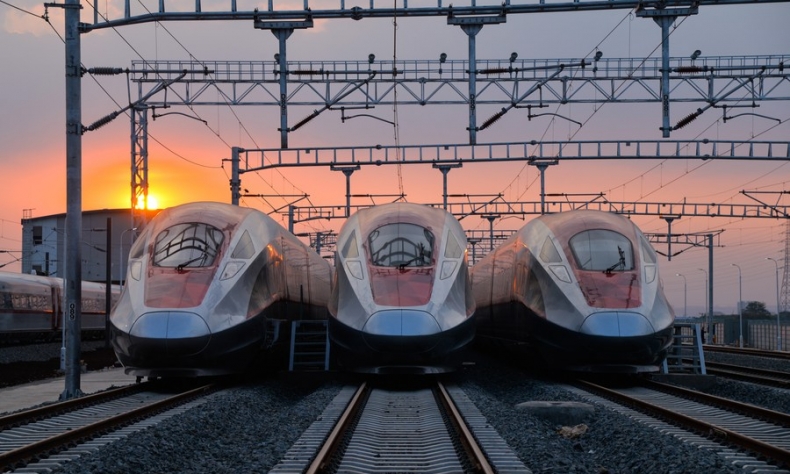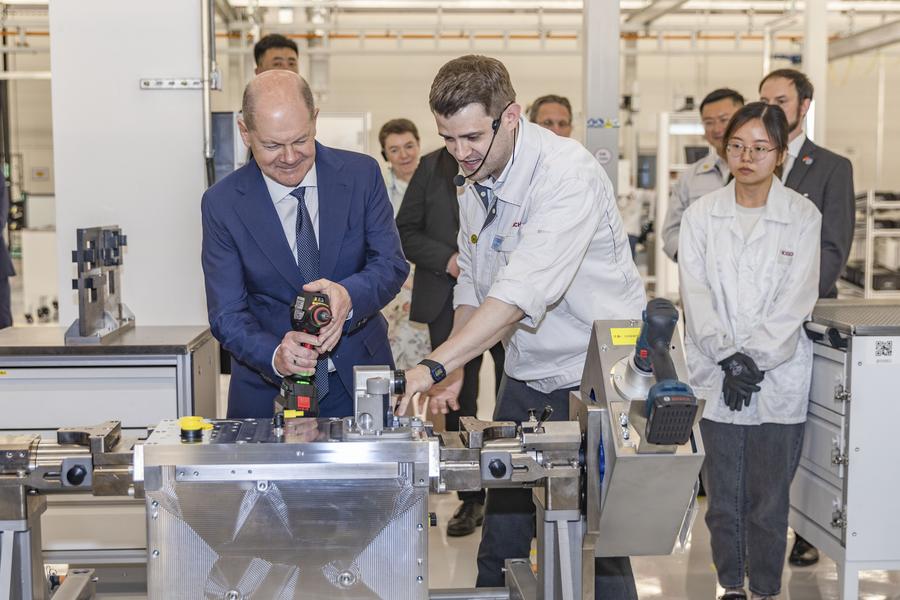Why China Is Essential for Humanity’s Shared Future

The arguments advocating decoupling with China, related to trade, technology, media and soft power, not only contradict the trends of economic globalization but also go against the true interests of the peoples of the world.
During my frequent trips to China, I see the positive outlook and hope for the future held by most of the Chinese population, based on their experience of continually improving their standard of living with the rise of China. This contrasts with the pessimistic view of the present and future held by most Europeans and Americans in the time of a major shift in the global pattern.
In particular, young people in Europe and the U.S. feel that their prospects for the future and their standard of living will be reduced in relation to that of their parents due to the misguided measures of unbridled capitalism, dominant in the countries of the so-called West, which triggered the real estate and financial bubble crisis of 2008 (originating in the U.S. but spreading throughout the world with lasting consequences).
As a researcher interested in social studies, I believe the explanation for this difference lies in the West’s declining living standards and increasingly corrupt democratic systems. These issues, facilitated by neoliberalism, have resulted in the erosion in the West of such social rights as access to food, health, housing and education, and reduced labor rights.
In reality, the U.S. can no longer dominate the world as it used to as the world moves steadily toward multipolarity, and we are witnessing continuous structural changes in which other great world civilizations, including Chinese, Indian, Russian, African, Arab, and European, are no longer accepting subservience to the U.S. These civilizations are cautiously asserting their identities in a multipolar world.
The growth of the BRICS is a prime example of this shift. The organization has expanded from five to 10 countries, driven by China and Russia, and initially joined by Brazil, India, and South Africa. Recently, the BRICS has grown to include Egypt, Ethiopia, Iran, the United Arab Emirates, and Saudi Arabia. The combined wealth of the BRICS countries now far exceeds that of the main Western countries represented in the G7, which the U.S. dominates.
The U.S. reaction to the decline of its global hegemony and the global shift toward multipolarity has been characterized by the increased use of unilateral sanctions on international trade, often imposed without regard to the World Trade Organization (WTO) rules. Simultaneously, the U.S. has promoted disinformation campaigns and supported regime change efforts, such as financing opposition groups in the Euromaidan protests in 2014 and promoting confrontation between geopolitical blocs.
The other Western governments have generally supported the U.S. hegemony, despite the U.S. comprising only around 4% of the world’s population, leading to the disruption of supply chains for their allies in attempts to isolate Russia and China, albeit unsuccessfully.

However, these Western governments’ support for the U.S. is by no means altruistic and unconditional, as they are economically dependent on the American dollar-dominated global financial system established by the Bretton Woods agreement and the NATO military alliance, which is heavily influenced by the North American arms industry.
Notably, in the face of the current global turbulence, China, while continuing its steady rise, has been actively and responsibly proposing to the international community the respect and promotion of the objectives and principles of the United Nations Charter. China has also put forth various proposals for international initiatives to increase global economic development and stability, such as the vision of a global community of shared future, the Belt and Road Initiative (BRI), the Global Development Initiative, the Global Security Initiative, and the Global Civilization Initiative.
At the same time, China is increasingly opening itself up to the outside world, intensifying its relations and promoting a network of partnerships with many countries. However, China does not lose sight of its main objective, that development must provide a better standard of living for its entire population of 1.4 billion.
With a view to sharing China’s development with the rest of the world, President Xi Jinping said in his written speech at the APEC CEO Summit in San Francisco on Nov. 16, 2023, “I also hope to see an active part of the global business community in the Chinese modernization drive to benefit from the huge opportunities brought by China’s high-quality development!”
Chinese society presents some advantageous structural characteristics, such as a socialist market economy, a large market in terms of demand, a diversified industrial system, a huge skilled workforce, and a business community growing substantially in quantity and qualifications. All of these represent great opportunities for foreign businesses.
Nowadays, it is uncommon for leaders to offer to share the competitive advantages and resources of their countries’ rapid and harmonious development with the international community.
I would therefore like to highlight some statements from President Xi Jinping: “We have confidence and even more capacity to achieve stable and long-term growth and, through our development, we will continue to provide the world with new impetus and opportunities for growth.” This statement is significant as “China continues to be the most powerful engine of global growth and will generate a third of global growth this year.”

China has hosted numerous significant international political and business leaders over the past weeks and months. These leaders have expressed their confidence in China, which they deem the “best investment destination.” Despite its rapid economic growth and advancements in high-value production, technological development, and artificial intelligence, China remains, above all, a reliable and resilient partner. The phrase “‘the next China’ is still China” underscores this sentiment, highlighting China’s commitment to deploying its human, scientific, and material resources in service of building a shared future for humanity.
Despite the growing narrative in some Western countries about decoupling and derisking, there are significant examples that underscore foreign investors’ confidence in China. For instance, the French company Airbus is constructing Factory 209 in Tianjin to assemble A320 aircraft, which is slated to commence operations in 2025.
Foreign politicians have also expressed their support for continued cooperation with China. Markus Soeder, minister-president of Bavaria, Germany, commenced his journey to China on March 23, followed by Dutch Prime Minister Mark Rutte, who visited China on March 26 and 27. French Foreign Minister Stephane Sejourne made a trip to China on April 1.
Remarkably, German Chancellor Olaf Scholz visited China for the second time as chancellor for three days from April 14 to 16, accompanied by a delegation of ministers and representatives of the main German companies, such as Siemens, BMW and Mercedes-Benz. According to the German Economic Institute, direct investment from Germany to China reached a record high of 11.9 billion euros ($12.7 billion) in 2023, a 4.3% increase compared to the previous year.
The visit was quite a success, with meetings held with President Xi Jinping and Prime Minister Li Qiang, and in the final statements, confidence in the deepening of economic relations between both countries was reaffirmed.
Next, if we look for a country to help chart the way forward for mankind, we’ll find that China has a lot to contribute.
China seeks sustainable growth, which is why it is committed to applying the new development philosophy, focusing on coordinated, green and inclusive innovation, and is pursuing high-quality development that incorporates high-added value. In recent years, there has been rapid growth in Chinese exports of the “new three,” namely new energy vehicles, lithium-ion batteries and photovoltaic products. A greenhouse gas emissions reduction trading market will be launched soon, creating huge green market opportunities.
China is continuing to open its markets to foreign direct investment, especially in the manufacturing industry, by announcing the removal of restrictive measures and creating more development opportunities and benefits for other countries.

Naturally, China has been prioritizing agreements with nearby countries, among which are the Digital Economy Partnership Agreement and the Regional Comprehensive Economic Partnership. The latter promotes trade and economic cooperation in the Asia-Pacific region and was signed in 2020. The largest and most influential member states are China and Indonesia, but the list also includes Australia, Brunei, Cambodia, Japan, South Korea, Laos, Malaysia, Myanmar, New Zealand, the Philippines, Singapore, Thailand and Vietnam.
On a global scale, China is stepping up collaboration with many countries on all continents through the BRI, proposed by Xi Jinping in 2013. Its success can be measured by the third Belt and Road Forum for International Cooperation, which resulted in 458 deliverables. Chinese financial institutions have established a financing window of 780 billion yuan (about $107 billion) for projects under BRI, and Chinese and foreign companies have closed deals worth $97.2 billion. All of this will contribute to high-quality cooperation under the BRI and boost connectivity, development and prosperity in BRICS countries across the Global South and the rest of the world.
Based on its internal development and the modernization of its economy, which is driven by science, technology, and innovation, China is committed to promoting the opening of its markets and providing quality services to foreign investors. China is continuing to improve mechanisms for protecting the rights and interests of foreign investors, sharing innovation factors, reforming the digital economy, and ensuring free and orderly data flow in accordance with the law. Entry and stay policies will be improved to facilitate foreigners’ adaptation to life in China, as well as access to financial, medical and electronic payment services.
The arguments advocating decoupling with China, related to trade, technology, media and soft power, not only contradict the trends of economic globalization but also go against the true interests of the peoples of the world, as working with China adds to the well-being of the world.
The Global South is influencing the emergence of more rational voices, contributing to the creation of more enlightened public opinions, including a call for an immediate ceasefire in current wars, so that peace becomes a reality (the first step toward the development of each country). It also contributes to the urgent and necessary collective fight against climate change as well as disinformation on the rise of China, and, in this way, to a prosperous global community of shared future.
Rui Lourido is a historian and president of the Observatory for China.
 Facebook
Facebook
 Twitter
Twitter
 Linkedin
Linkedin
 Google +
Google +










